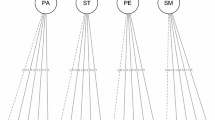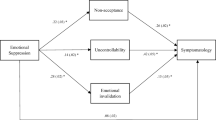Abstract
The Leahy Emotional Schema Scale II (LESS II) was developed based on the emotional schema model, a meta-experiential model targeting emotion and emotion regulation (Leahy 2012). This model is important for identifying individuals’ negative beliefs about emotions as well as for dealing with noncompliance, resistance, and drop-outs in cognitive behavioral therapy. The primary aim of the current study was to explore the factor structures of the previously validated LESS II, and investigate its reliability and validity within a Korean sample. The secondary aim of this study was to examine how emotional schema would be associated with the emotional distress and behavioral problems of Korean college students. A total of 1478 college students participated in the current study and were administered questionnaires including the Leahy Emotional Schema Scale II, Counseling Center Assessment of Psychological Symptoms (CCAPS), and College Adjustments Inventory-Short Form (CAIS). A series of statistical analyses resulted in the deletion of several items and emotional schema dimensions from the LESS II, owing to methodological and cultural reasons. The final results showed that the two-factor model with 10 items was the model with the better fit than was the original 14-factor structure model with 28 items. The total score of the 10-item LESS II showed great convergent validity, with moderate to strong positive correlations with CCAPS subscales. Furthermore, the 10-item LESS II demonstrated high internal consistency and shared approximately 87.05% of variance with the original 28-item LESS II. The findings of the current study provide strong support for the clinical and research application of the 10-item LESS II.


Similar content being viewed by others
References
American Psychiatric Association. (2000). Diagnostic and statistical manual of mental disorders: DSM-IV-TR. Washington, DC: American Psychiatric Association.
Bagozzi, R., Wong, N., & Yi, Y. (1999). The role of culture and gender and the relationship between positive and negative affect. Cognit Emot, 3, 641–672.
Batmaz, S., & Özdel, K. (2015). Psychometric properties of the Turkish version of the Leahy Emotional Schema Scale-II. Anatolian Journal of Psychiatry/Anadolu Psikiyatri Dergisi, 16(Supplement 1), 23–30.
Beck, A. T., Steer, R. A., & Brown, G. K. (1996). Manual for the Beck Depression Inventory-II. San Antonio, TX: Psychological Corporation.
Bond, F. W., Hayes, S. C., Baer, R. A., Carpenter, K. M., Guenole, N., Orcutt, H. K., ... & Zettle, R. D. (2011). Preliminary psychometric properties of the Acceptance and Action Questionnaire–II: a revised measure of psychological inflexibility and experiential avoidance. Behav Ther, 42(4), 676–688.
Brown, K. W., & Ryan, R. M. (2003). The benefits of being present: mindfulness and its role in psychological well-being. J Pers Soc Psychol, 84, 822–848.
Butler, E. A., Egloff, B., Wilhelm, F. H., Smith, N. C., Erickson, E. A., & Gross, J. J. (2003). The social consequences of expressive suppression. Emotion, 3, 48–67.
Butler, E. A., Lee, T. L., & Gross, J. J. (2007). Emotion regulation and culture: are the social consequences of emotion suppression culture-specific? Emotion, 7(1), 30.
Choi, I., & Choi, Y. (2002). Culture and self-concept flexibility. Personal Soc Psychol Bull, 28, 1508–1517.
Greenberg, L. S. (2004). Emotion–focused therapy. Clinical Psychology & Psychotherapy, 11(1), 3–16.
Gross, J. J., & John, O. P. (2003). Individual differences in two emotion regulation processes: implications for affect, relationships, and wellbeing. J Pers Soc Psychol, 85, 348–362.
Gross, J. J., & Thompson, R. A. (2007). Emotion regulation: conceptual foundations. In J. J. Gross (Ed.), Handbook of emotion regulation (pp. 3–24). New York, NY: Guilford Press.
Hayes, S. C., Strosahl, K. D., & Wilson, K. G. (1999). Acceptance and commitment therapy: an experiential approach to behavior change. New York: Guilford Press.
Henson, R. K. (2001). Understanding internal consistency reliability estimates: a conceptual primer on coefficient alpha. Meas Eval Couns Dev, 34, 177–189.
Heywood, H. B. (1931). On finite sequences of real numbers. Proc R Soc Lond A, 134(824), 486–501.
Issakidis, C., & Andrews, G. (2004). Pretreatment attrition and dropout in an outpatient clinic for anxiety disorders. Acta Psychiatr Scand, 109(6), 426–433.
Kim, D. H., Pan, Y. G., & Park, H. S. (1998). High versus low context culture: a comparison of Chinese, Korean, and American cultures. Psychology & Marketing, 15(6), 507–521.
Kim, Y. J., Sohn, D. Y., & Choi, S. M. (2011). Cultural difference in motivations for using social network sites: a comparative study of American and Korean college students. Comput Hum Behav, 27(1), 365–372.
Kleinman, A. (1982). Neurasthenia and depression: A study of somatization and culture in China. Cult Med Psychiatry, 6(2), 117–190.
Kline, R. B. (2011). Principles and practice of structural equation modeling (3rd ed.). New York, NY: The Guilford Press.
Leahy, R. L. (2001). Depressive decision making: validation of the portfolio theory model. J Cogn Psychother, 15(4), 341.
Leahy, R. L. (2002). A model of emotional schemas. Cogn Behav Pract, 9(3), 177–190.
Leahy, R. L. (2007a). Emotional schemas and resistance to change in anxiety disorders. Cogn Behav Pract, 14(1), 36–45.
Leahy, R. L. (2007b). Emotional schemas and self-help: homework compliance and obsessive-compulsive disorder. Cogn Behav Pract, 14(3), 297–302.
Leahy, R. L. (2012). Leahy Emotional Schema Scale II (LESS II). Unpublished manuscript, American Institute for Cognitive Therapy, New York.
Leahy, R. L. (2016). Emotional schema therapy: a meta-experiential model. Aust Psychol, 51(2), 82–88.
Leahy, R. L., & Wupperman, P. (2015). Emotion regulation and psychopathology: pathways, processes, and treatment. Unpublished manuscript, American Institute for Cognitive Therapy, New York.
Leahy, R. L., Tirch, D. D., & Melwani, P. S. (2012). Processes underlying depression: risk aversion, emotional schemas, and psychological flexibility. International Journal of Cognitive Therapy, 5(4), 362–379.
Lee, S. H. (1977). A study on the hwa-byung (anger syndrome). Journal of Korean General Hospital, 1, 63–69.
Lee, K. A., Shin, H. L., Yoo, N. H., & Lee, K. H. (2008). The development and validation of the college adjustment inventory-short form. The Korea Journal of Counseling, 9(2), 739–745.
Lee, S., Kim, J., Choi, S., Chae, J., Choi, Y., Seo, D. G., & Kwon, H. (2017). New directions for depression studies: Introduction of behavioral science approach. The Korean Journal of Psychology: General, 36(3), 293–323.
Lin, K. M., & Cheung, F. (1999). Mental health issues for Asian Americans. Psychiatr Serv, 50(6), 774–780.
Linehan, M. M. (1993). Cognitive-behavioral treatment of borderline personality disorder. New York: Guilford Press.
Locke, B. D., McAleavey, A. A., Zhao, Y., Lei, P. W., Hayes, J. A., Castonguay, L. G., et al. (2012). Development and initial validation of the counseling center assessment of psychological symptoms–34. Meas Eval Couns Dev, 45(3), 151–169.
Okazaki, S. (1997). Sources of ethnic differences between Asian American and White American college students on measures of depression and social anxiety. J Abnorm Psychol, 106, 52–60.
Park, Y. J., Kim, H. S., Schwartz-Barcott, D., & Kim, J. W. (2002). The conceptual structure of hwa-byung in middle-aged Korean women. Health Care for Women International, 23(4), 389–397.
Park, H., Rehg, M. T., & Lee, D. (2005). The influence of Confucian ethics and collectivism on whistle blowing intentions: a study of South Korean public employees. J Bus Ethics, 58(4), 387–403.
Peng, K., & Nisbett, R. E. (1999). Culture, dialectics, and reasoning about contradiction. Am Psychol, 54, 741–754.
Schimmack, U., Oishi, S., & Diener, E. (2002). Cultural influences on the relation between pleasant emotions and unpleasant emotions: Asian dialectic philosophies or individualism-collectivism? Cognit Emot, 16, 705–719.
Segal, Z. V., Williams, J. M. G., & Teasdale, J. D. (2002). Mindfulness-based cognitive therapy for depression: a new approach to preventing relapse. New York: Guilford Press.
Silberstein, L. R., Tirch, D., Leahy, R. L., & McGinn, L. (2012). Mindfulness, psychological flexibility, and emotional schemas. International Journal of Cognitive Therapy, 5(4), 406–419.
Souery, D., Oswald, P., Massat, I., Bailer, U., Bollen, J., Demyttenaere, K., et al. (2007). Clinical factors associated with treatment resistance in major depressive disorder: results from a European multicenter study. J Clin Psychiatry, 68(7), 1062–1070.
Spencer-Rodgers, J., Peng, K., Wang, L., & Hou, Y. (2004). Dialectical self-esteem and east-west differences in psychological well-being. Personal Soc Psychol Bull, 30, 1416–1432.
Sue, D. W., & Kirk, B. A. (1975). Asian-Americans: use of counseling and psychiatric services on a college campus. J Couns Psychol, 22, 84–86.
Tirch, D. D., Leahy, R. L., Silberstein, L. R., & Melwani, P. S. (2012). Emotional schemas, psychological flexibility, and anxiety: the role of flexible response patterns to anxious arousal. International Journal of Cognitive Therapy, 5(4), 380–391.
Tracey, T., Leong, F., & Glidden, C. (1986). Help seeking and problem perception among Asian Americans. J Couns Psychol, 33, 331–336.
Wenze, S. J., Goldberg, J. F., Singer, T. M., Endick, C. J., & Leahy, R. L. (2003, TBA). Longitudinal assessment of emotional schemas in bipolar outpatients. Paper presented at the American Psychiatric Association, San Francisco.
Yavuz, K. F., Türkçapar, M. H., Demirel, B., & Karadere, E. (2011). Adaptation, validity and reliability of the Leahy Emotional Schema Scale Turkish version based on Turkish university students and workers. Dusunen Adam, 24(4), 273.
Funding
This work was supported by the Ministry of Education of the Republic of the Korea and National Research Foundation of Korea (NRF-2017S1A5B6053101), the General Collaborative Research Project (2018S1A5A2A03030006), and the MSIT (Ministry of Science and ICT), Korea, under the ITRC (Information Technology Research Center) support program (IITP-2018-0-01405) supervised by the IITP (Institute for Information & communications Technology Promotion).
Author information
Authors and Affiliations
Corresponding authors
Additional information
Publisher’s Note
Springer Nature remains neutral with regard to jurisdictional claims in published maps and institutional affiliations.
Rights and permissions
About this article
Cite this article
Suh, JW., Lee, H.J., Yoo, N. et al. A Brief Version of the Leahy Emotional Schema Scale: a Validation Study. J Cogn Ther 12, 38–54 (2019). https://doi.org/10.1007/s41811-018-0039-4
Published:
Issue Date:
DOI: https://doi.org/10.1007/s41811-018-0039-4




